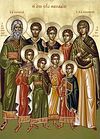

| Previous day | Next day |
| Old Style
August 1
|
Sunday |
New Style
August 14
|
|
9th Sunday after Pentecost.
Tone 8.
Начало Успенского поста. |
Wine and oil allowed.
|
![]() Procession of the Precious Wood of the Life-giving Cross of the Lord.
Procession of the Precious Wood of the Life-giving Cross of the Lord. ![]() Feast of the All-Merciful Savior and the Most Holy Theotokos (commemoration of the victory of St. Andrew Bogolubsky over the Volga Bulgars) (1164).
Feast of the All-Merciful Savior and the Most Holy Theotokos (commemoration of the victory of St. Andrew Bogolubsky over the Volga Bulgars) (1164). ![]() Holy Seven Maccabees: Martyrs Abimus, Antonius, Gurias, Eleazar, Eusebonus, Alimus, and Marcellus, their mother Solomonia, and their teacher Eleazar (166 b.c.).
Holy Seven Maccabees: Martyrs Abimus, Antonius, Gurias, Eleazar, Eusebonus, Alimus, and Marcellus, their mother Solomonia, and their teacher Eleazar (166 b.c.).
Nine Martyrs of Perge in Pamphylia: Leontius, Attius, Alexander, Cindeus, Minsitheus (Mnesitheus), Cyriacus, Mineon (Menaeus), Catanus, and Eucleus (3rd c.). Uncovering of the relics (1995) of St. Sophia of Suzdal, nun (in the world Solomonia)(1542), wife of Grand Duke Basil III of Moscow (1995). St. Nicholas, Equal-to-the-Apostles, enlightener of Japan (1912).
New Hieromartyr Dimitry Pavsky, archpriest, of Ulyanovo (Tver) (1937).
St. Eusebius, bishop of Verceil (Italy) (ca. 371). Martyr Elessa of Cythera (375). Sts. Friardus of Vindumitta (573) and Secundellus, deacon (6th c.), of Gaul. St. Timothy the Wonderworker, bishop of Proconnesus (6th c.). St. Cennydd (Kenneth), monk, of Llangenydd (Wales) (6th. c.). St. Ethelwold, bishop of Winchester (984).
Repose of Abbess Alexia of Nizhni-Novgorod (1940).
Thoughts for Each Day of the Year
According to the Daily Church Readings from the Word of God
By St. Theophan the Recluse

Ninth Sunday After Pentacost. [I Cor. 3:9-17; Matt. 14:22-34]
The holy apostle Peter, with the Lord’s permission, gets down from the ship and walks on the water; then he yields to the movement of fear and begins to drown. The fact that he decided upon such an unusual act, hoping in the Lord, is nothing deserving reprimand—otherwise the Lord would not have allowed him to do this. The reprimand comes because he did not sustain the original state of his soul. He was filled with inspired hope in the Lord’s ability to do anything, and this gave him the boldness to entrust himself to the waves. Several steps were already made along this new path—it was necessary only to stand more firmly in hope, gazing at the Lord Who is near, and at the experience of walking in His strength. Instead, gave himself over to human thoughts: “The wind is strong, the waves are great, the water is not firm;” and this shook loose and weakened his firmness of faith and hope. Because of this he broke away from the Lord’s hands, and, left to the operation of nature’s laws, began to drown. The Lord rebuked him: O ye of little faith! Why did you doubt? showing that in this lay the entire reason for the misfortune. Behold a lesson for all who undertake something, great or small, with the aim of pleasing the Lord! Keep your first state of faith and hope, from which a great virtue is born—patience in doing good, which serves as the basis for a God-pleasing life. As long as these dispositions are maintained, inspiration for labouring on the path begun does not go away; and obstacles, no matter how great they may be, are not noticed. When these dispositions weaken, the soul is filled with human reasoning about human methods of preserving one’s life and conducting the affairs which one has begun. But since this reasoning always turns out to be powerless, fear of how one should be enters the soul; from this comes wavering—wondering whether or not to continue—and in the end comes a complete return. You must do it this way; if you begin, keep it up—chase away troubling thoughts, and be bold in the Lord, Who is nearby.








